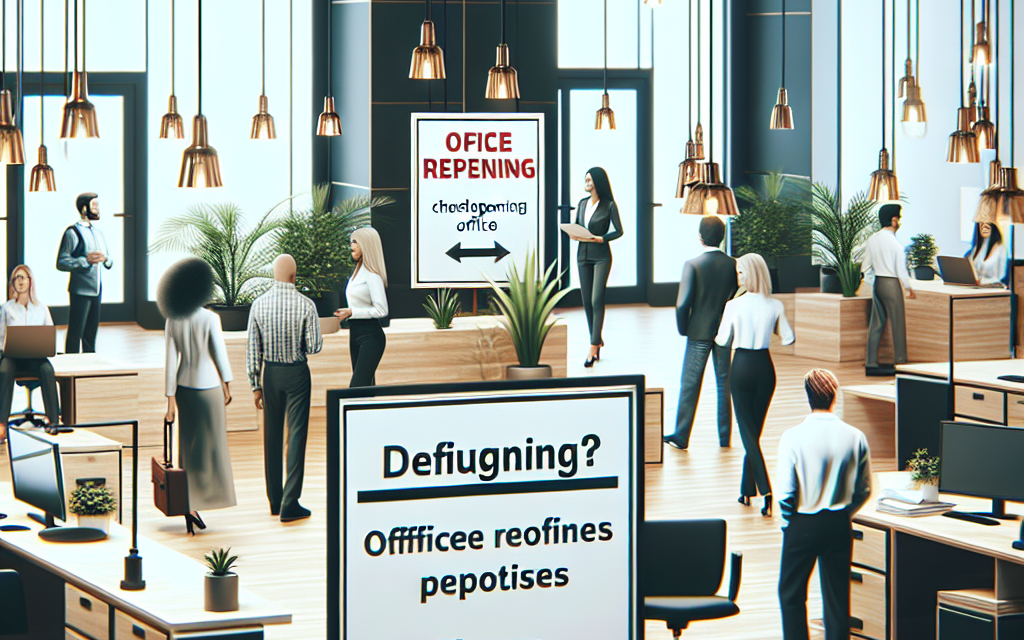“JPMorgan’s Office Reopening Policy: A Catalyst for Internal Dissent.”
Introduction
JPMorgan Chase’s recent office reopening policy has ignited significant internal backlash among employees, reflecting growing tensions between management’s push for a return to in-person work and the preferences of a workforce increasingly accustomed to remote flexibility. As the bank mandates a more structured office presence, many employees express concerns over work-life balance, health safety, and the potential loss of productivity associated with commuting. This situation highlights the broader challenges faced by organizations navigating the post-pandemic landscape, where employee expectations and corporate policies often clash.
Employee Reactions to JPMorgan’s Office Reopening Policy
JPMorgan’s recent decision to implement an office reopening policy has elicited a range of reactions from its employees, reflecting a complex interplay of sentiments regarding workplace dynamics in the post-pandemic era. As the financial giant moves towards a more traditional work environment, many employees have expressed concerns about the implications of this shift on their work-life balance, productivity, and overall job satisfaction. The policy, which mandates a return to the office for most employees, has been met with resistance from those who have grown accustomed to the flexibility of remote work.
Initially, the reopening policy was framed as a necessary step to foster collaboration and innovation, which are often seen as vital components of the company’s success. However, as employees began to digest the details of the policy, a palpable sense of unease emerged. Many workers have voiced their apprehensions about the potential loss of autonomy that comes with a mandatory return to the office. For some, the ability to work from home has not only enhanced their productivity but has also allowed for a more manageable integration of personal and professional responsibilities. Consequently, the prospect of reverting to a more rigid office structure has raised questions about the company’s commitment to employee well-being.
Moreover, the reopening policy has sparked discussions about the broader implications for workplace culture. Employees have noted that the pandemic has fundamentally altered their expectations regarding work environments. The flexibility afforded by remote work has led many to reevaluate their priorities, with some even considering alternative employment opportunities that offer more accommodating arrangements. This shift in mindset has prompted a wave of internal dialogue, as employees seek to understand how the company’s policies align with their evolving needs and values.
In addition to concerns about work-life balance, employees have also raised issues related to health and safety. Despite the easing of pandemic-related restrictions, many remain wary of returning to crowded office spaces. The lingering effects of COVID-19 have left some employees feeling anxious about potential exposure, particularly in high-density environments. This apprehension has led to calls for clearer communication from management regarding health protocols and safety measures that will be implemented in the office. Employees are seeking reassurance that their health and well-being will be prioritized as they transition back to in-person work.
Furthermore, the reopening policy has highlighted disparities in employee experiences and preferences. While some individuals thrive in an office setting, benefiting from face-to-face interactions and immediate access to resources, others have found that remote work has allowed them to perform at their best. This divergence in experiences has fueled discussions about the need for a more flexible approach to work arrangements, one that accommodates diverse preferences and acknowledges the varying circumstances of employees.
As the situation continues to evolve, it is clear that JPMorgan’s office reopening policy has ignited a significant conversation among its workforce. Employees are not only grappling with the immediate implications of returning to the office but are also reflecting on the long-term impact of such policies on their careers and personal lives. The company’s leadership faces the challenge of navigating these complex dynamics while fostering an inclusive environment that respects the diverse needs of its employees. Ultimately, the success of the reopening policy will depend on the extent to which management listens to employee feedback and adapts its approach to create a workplace that balances collaboration with individual flexibility.
The Impact of Remote Work on JPMorgan’s Culture
The impact of remote work on JPMorgan’s culture has become a focal point of discussion, particularly in light of the bank’s recent office reopening policy. As organizations worldwide adapted to the challenges posed by the COVID-19 pandemic, many employees found themselves transitioning to remote work, which not only altered their daily routines but also reshaped the very fabric of workplace culture. At JPMorgan, this shift has prompted a reevaluation of traditional work practices and has led to a growing divide among employees regarding their preferences for in-office versus remote work.
Initially, the remote work model allowed employees to experience a level of flexibility that was previously uncommon in the banking sector. This newfound autonomy enabled many to balance their professional responsibilities with personal commitments more effectively. As a result, employees reported increased job satisfaction and productivity, which contributed positively to the overall morale within the organization. However, as the pandemic waned and companies began to consider a return to the office, the cultural implications of this shift became increasingly apparent.
JPMorgan’s decision to implement a more stringent office reopening policy has sparked significant internal backlash, particularly among employees who have grown accustomed to the benefits of remote work. Many staff members argue that the flexibility they enjoyed during the pandemic has fostered a more inclusive and diverse work environment, allowing individuals to contribute to the organization in ways that align with their personal circumstances. This sentiment highlights a broader cultural shift within the company, as employees increasingly value work-life balance and the ability to tailor their work environments to suit their needs.
Moreover, the push for a return to the office has raised concerns about the potential erosion of the collaborative spirit that remote work had inadvertently nurtured. While in-person interactions are essential for fostering relationships and facilitating teamwork, the remote work model has also encouraged employees to leverage technology in innovative ways. Virtual meetings and collaborative platforms have enabled teams to connect across geographical boundaries, fostering a sense of unity that transcends physical office spaces. As such, the challenge for JPMorgan lies in finding a balance between maintaining the benefits of remote work while also preserving the essential elements of its corporate culture.
In addition, the reopening policy has highlighted disparities in employee experiences and expectations. Some employees feel a strong sense of loyalty to the organization and are eager to return to the office, believing that in-person collaboration is vital for professional growth and development. Conversely, others express frustration over the perceived lack of consideration for their preferences and the potential negative impact on their work-life balance. This divide has led to a growing sense of discontent among employees, prompting discussions about the future of work at JPMorgan and the need for a more inclusive approach to workplace policies.
As JPMorgan navigates this complex landscape, it is crucial for leadership to engage in open dialogue with employees to understand their concerns and preferences. By fostering a culture of transparency and inclusivity, the organization can work towards a hybrid model that accommodates diverse working styles while preserving the core values that define its culture. Ultimately, the impact of remote work on JPMorgan’s culture will continue to evolve, and the bank’s ability to adapt to these changes will be instrumental in shaping its future success.
Comparing JPMorgan’s Reopening Strategy to Competitors
JPMorgan Chase’s recent decision to implement a mandatory office reopening policy has ignited significant internal backlash, particularly when compared to the more flexible approaches adopted by its competitors in the financial sector. As the pandemic has reshaped workplace dynamics, many firms have recognized the importance of adapting to employee preferences, leading to a divergence in strategies among major players in the industry. This contrast raises important questions about the long-term implications of such policies on employee morale, productivity, and talent retention.
In stark contrast to JPMorgan’s rigid stance, several of its competitors have embraced hybrid work models that prioritize employee autonomy. For instance, Goldman Sachs has taken a more lenient approach, allowing employees to work remotely several days a week while still encouraging in-office collaboration. This flexibility not only acknowledges the diverse needs of the workforce but also fosters a culture of trust and accountability. By empowering employees to choose their work environment, Goldman Sachs has positioned itself as an attractive employer, particularly for younger professionals who value work-life balance.
Similarly, Bank of America has adopted a more accommodating policy, permitting employees to work from home on a case-by-case basis. This strategy reflects a growing recognition that productivity does not solely hinge on physical presence in the office. Instead, it emphasizes the importance of results and outcomes, which can often be achieved through remote work. By prioritizing employee well-being and satisfaction, Bank of America has cultivated a positive workplace culture that resonates with its workforce, thereby enhancing employee loyalty and reducing turnover.
Moreover, Citigroup has taken a proactive stance by implementing a flexible work policy that allows employees to choose their preferred work arrangements. This approach not only acknowledges the varying circumstances of employees but also demonstrates a commitment to inclusivity and adaptability. By fostering an environment where employees feel valued and heard, Citigroup has effectively mitigated potential dissatisfaction that could arise from a more rigid policy, such as that of JPMorgan.
As JPMorgan’s reopening policy continues to face scrutiny, it is essential to consider the potential ramifications of its approach on employee engagement and retention. The financial services industry is highly competitive, and firms that fail to adapt to the evolving expectations of their workforce risk losing top talent to competitors that offer more flexible arrangements. In an era where remote work has become increasingly normalized, employees are more likely to seek opportunities with organizations that prioritize their needs and preferences.
Furthermore, the backlash against JPMorgan’s policy may also have broader implications for its corporate culture. A workforce that feels undervalued or constrained by inflexible policies may experience decreased morale and productivity, ultimately impacting the firm’s overall performance. In contrast, companies that prioritize employee well-being and foster a culture of collaboration and trust are likely to see enhanced innovation and creativity, which are crucial for maintaining a competitive edge in the financial sector.
In conclusion, JPMorgan’s office reopening policy stands in stark contrast to the more flexible strategies employed by its competitors. As the industry continues to evolve, the ability to adapt to employee needs will be paramount for attracting and retaining talent. The ongoing internal backlash at JPMorgan serves as a reminder that a one-size-fits-all approach may not be sustainable in a landscape where employee preferences are increasingly diverse and complex. Ultimately, the firms that prioritize flexibility and employee satisfaction are likely to emerge as leaders in the post-pandemic workplace.
The Role of Leadership in Managing Office Reopening Backlash
As organizations navigate the complexities of returning to the office in a post-pandemic world, the role of leadership becomes increasingly critical, particularly in the context of policies that may not align with employee expectations. JPMorgan Chase, one of the largest financial institutions globally, has recently faced significant internal backlash regarding its office reopening policy. This situation underscores the importance of effective leadership in managing employee sentiments and fostering a culture of trust and collaboration.
Leadership at JPMorgan has emphasized the necessity of returning to the office to enhance productivity and maintain the company’s competitive edge. However, this directive has not been universally welcomed among employees, many of whom have grown accustomed to the flexibility and work-life balance that remote work offers. The disconnect between leadership’s vision and employee preferences has led to a palpable sense of frustration and discontent within the workforce. This scenario illustrates a broader challenge that many organizations face: balancing operational needs with the evolving expectations of their employees.
In addressing the backlash, it is essential for leaders to engage in open and transparent communication. By actively listening to employee concerns and acknowledging their feelings, leaders can foster a sense of inclusion and respect. This approach not only helps to mitigate feelings of resentment but also encourages a collaborative atmosphere where employees feel valued and heard. For instance, leaders at JPMorgan could benefit from hosting forums or town hall meetings where employees can voice their opinions and share their experiences regarding the transition back to the office. Such initiatives can serve as a platform for dialogue, allowing leadership to better understand the diverse perspectives within their workforce.
Moreover, effective leadership involves demonstrating empathy and flexibility in response to employee feedback. While the company may have a strategic rationale for its reopening policy, leaders must recognize that a one-size-fits-all approach may not be suitable for every employee. By considering hybrid work models or offering flexible schedules, leaders can accommodate varying needs and preferences, thereby enhancing employee satisfaction and retention. This adaptability not only reflects a commitment to employee well-being but also reinforces the notion that leadership is responsive to the changing dynamics of the workplace.
Additionally, leaders must articulate a clear vision that aligns the company’s goals with employee aspirations. By framing the office reopening as an opportunity for collaboration, innovation, and community building, leaders can help employees see the potential benefits of returning to the office. This narrative can be particularly effective if it emphasizes the importance of teamwork and the value of in-person interactions in fostering creativity and problem-solving. When employees understand the rationale behind leadership decisions, they are more likely to feel invested in the outcomes and less resistant to change.
Ultimately, the backlash faced by JPMorgan regarding its office reopening policy serves as a reminder of the critical role that leadership plays in navigating complex organizational changes. By prioritizing communication, empathy, and a shared vision, leaders can effectively manage employee concerns and foster a positive workplace culture. As organizations continue to adapt to the evolving landscape of work, the ability to balance operational objectives with employee needs will be paramount in ensuring long-term success and employee engagement. In this context, effective leadership is not merely about making decisions; it is about cultivating an environment where employees feel empowered and motivated to contribute to the organization’s goals.
Employee Well-Being and Work-Life Balance Concerns
JPMorgan’s recent decision to implement a mandatory office reopening policy has ignited significant internal backlash, particularly concerning employee well-being and work-life balance. As the financial giant navigates the post-pandemic landscape, the shift back to in-person work has raised critical questions about the implications for its workforce. Many employees, who have grown accustomed to the flexibility of remote work, are expressing concerns that the new policy may undermine their mental health and overall job satisfaction.
The pandemic has fundamentally altered the way people perceive work-life balance. For many, the ability to work from home has not only provided a reprieve from lengthy commutes but has also allowed for a more harmonious integration of personal and professional responsibilities. Employees have reported increased productivity and a greater sense of autonomy while working remotely. However, JPMorgan’s directive to return to the office has disrupted this newfound equilibrium, leading to feelings of anxiety and uncertainty among staff members. The abrupt transition back to a traditional office environment has prompted employees to question whether their well-being is being prioritized in the company’s strategic decisions.
Moreover, the reopening policy has sparked discussions about the broader implications of workplace culture. Employees are increasingly advocating for a more flexible approach that accommodates individual needs and preferences. The rigid structure of mandatory office attendance may not only affect morale but could also lead to higher turnover rates as employees seek opportunities that offer a better balance between their professional and personal lives. In this context, the company’s commitment to fostering a supportive work environment is being scrutinized, as many feel that the new policy contradicts the values of inclusivity and employee empowerment that JPMorgan has long espoused.
In addition to concerns about mental health, the reopening policy raises questions about the practicalities of commuting and its impact on employees’ daily lives. For those who live far from the office, the return to in-person work can mean significant time lost in transit, which can exacerbate stress and diminish overall job satisfaction. The potential for increased commuting times may also disproportionately affect employees with caregiving responsibilities, further complicating their ability to maintain a healthy work-life balance. As such, the policy appears to overlook the diverse circumstances of the workforce, leading to feelings of alienation among those who feel their needs are not being considered.
Furthermore, the ongoing discourse surrounding employee well-being highlights the importance of open communication between management and staff. Employees are calling for a more collaborative approach to policy-making, one that takes into account their feedback and experiences. By fostering an environment where employees feel heard and valued, JPMorgan could not only mitigate backlash but also enhance employee engagement and loyalty. This dialogue is essential for creating a workplace culture that prioritizes well-being and recognizes the diverse needs of its workforce.
In conclusion, JPMorgan’s office reopening policy has sparked significant concerns regarding employee well-being and work-life balance. As the company navigates this transition, it is crucial for leadership to consider the implications of their decisions on employee morale and satisfaction. By prioritizing flexibility and fostering open communication, JPMorgan has the opportunity to create a more inclusive and supportive work environment that aligns with the evolving expectations of its workforce. Ultimately, the success of the reopening strategy will depend on the company’s ability to balance operational goals with the well-being of its employees.
Legal Implications of JPMorgan’s Reopening Policy
JPMorgan’s recent decision to implement a reopening policy for its offices has ignited significant internal backlash, raising various legal implications that merit careful consideration. As the financial giant navigates the complexities of returning to in-person work, it must balance operational needs with the rights and concerns of its employees. This situation is particularly pertinent in light of the ongoing discussions surrounding workplace safety, employee rights, and the evolving legal landscape shaped by the COVID-19 pandemic.
One of the primary legal implications of JPMorgan’s reopening policy revolves around workplace safety regulations. Employers are obligated to provide a safe working environment under the Occupational Safety and Health Administration (OSHA) guidelines. As such, JPMorgan must ensure that its offices comply with health protocols, including social distancing measures, adequate ventilation, and sanitation practices. Failure to adhere to these regulations could expose the company to potential lawsuits from employees who may contract COVID-19 or other illnesses as a result of unsafe working conditions. Consequently, the bank’s management must be diligent in implementing and communicating these safety measures to mitigate legal risks.
Moreover, the reopening policy raises questions about employee rights, particularly regarding the Americans with Disabilities Act (ADA). Employees with pre-existing health conditions or disabilities may be at a heightened risk if required to return to the office. In this context, JPMorgan must consider reasonable accommodations for these individuals, which could include remote work options or modified workspaces. If the bank fails to provide such accommodations, it could face legal challenges from employees who feel their rights have been violated. Therefore, it is crucial for JPMorgan to engage in open dialogue with its workforce to understand their concerns and address them appropriately.
In addition to health and safety regulations, the reopening policy also intersects with labor laws and employee relations. The backlash from employees may indicate a broader discontent with management’s approach to workplace flexibility. As many companies have adopted hybrid work models, JPMorgan’s insistence on a return to the office could be perceived as a regression, potentially leading to grievances or unionization efforts. If employees feel that their voices are not being heard, they may seek legal recourse through labor boards or other channels. Thus, it is essential for JPMorgan to foster a culture of transparency and inclusivity, allowing employees to express their concerns without fear of retaliation.
Furthermore, the reopening policy could have implications for employee morale and retention. In an era where talent acquisition is increasingly competitive, companies must prioritize employee satisfaction to maintain a productive workforce. If JPMorgan’s policy is viewed as inflexible or dismissive of employee needs, it may lead to higher turnover rates, which can be costly both financially and in terms of company reputation. Legal ramifications may arise if disgruntled employees choose to pursue claims related to constructive dismissal or hostile work environments.
In conclusion, JPMorgan’s office reopening policy presents a myriad of legal implications that the company must navigate with care. By prioritizing workplace safety, respecting employee rights, and fostering open communication, JPMorgan can mitigate potential legal risks while also addressing the concerns of its workforce. As the company moves forward, it is imperative that it remains attuned to the evolving legal landscape and the expectations of its employees, ensuring that its policies reflect a commitment to both operational efficiency and employee well-being.
Future of Hybrid Work Models at JPMorgan
JPMorgan’s recent decision to implement a more structured office reopening policy has ignited significant internal backlash, raising questions about the future of hybrid work models within the organization. As the financial giant navigates the post-pandemic landscape, the tension between management’s vision for a return to in-person work and employees’ preferences for flexibility has become increasingly pronounced. This situation reflects broader trends in the corporate world, where many companies are grappling with the balance between operational efficiency and employee satisfaction.
The bank’s leadership has emphasized the importance of collaboration and innovation, arguing that in-person interactions foster a culture of teamwork that is difficult to replicate in a remote environment. They contend that the spontaneous conversations and brainstorming sessions that occur in physical office spaces are vital for driving creativity and maintaining a competitive edge in the fast-paced financial sector. However, this perspective has not resonated universally among employees, many of whom have grown accustomed to the flexibility and work-life balance that remote work offers.
As employees express their concerns, it becomes evident that the desire for hybrid work arrangements is not merely a fleeting trend but rather a fundamental shift in workplace expectations. Many workers have reported increased productivity while working from home, citing fewer distractions and the ability to tailor their work environments to suit their needs. This sentiment is echoed across various industries, where employees are advocating for a more flexible approach that accommodates both in-person collaboration and remote work.
In response to the backlash, JPMorgan’s management faces the challenge of reconciling these differing viewpoints. The bank’s leadership must consider how to create a work environment that not only meets the operational goals of the organization but also addresses the evolving preferences of its workforce. This balancing act is further complicated by the competitive labor market, where companies that offer flexible work arrangements are increasingly seen as more attractive to potential hires.
Moreover, the conversation surrounding hybrid work models at JPMorgan is not solely about logistics; it also touches on broader themes of trust and autonomy. Employees who have successfully managed their responsibilities from home may feel that a rigid return-to-office policy undermines their professionalism and capability. This perception can lead to decreased morale and engagement, ultimately impacting the organization’s overall performance. Therefore, it is crucial for management to foster an environment of trust, where employees feel empowered to take ownership of their work arrangements.
As JPMorgan navigates this complex landscape, it may benefit from exploring hybrid work models that allow for greater flexibility while still promoting collaboration. For instance, implementing a system where employees can choose their in-office days or creating designated collaboration spaces could help bridge the gap between management’s goals and employees’ desires. By actively involving employees in the decision-making process, the bank can cultivate a sense of ownership and commitment to the organization’s vision.
In conclusion, JPMorgan’s office reopening policy has sparked a critical dialogue about the future of hybrid work models within the company. As the organization grapples with the challenges of balancing operational needs with employee preferences, it must remain attuned to the evolving landscape of work. By embracing flexibility and fostering a culture of trust, JPMorgan can position itself as a leader in the new era of work, ultimately enhancing both employee satisfaction and organizational performance.
Q&A
1. **What is JPMorgan’s Office Reopening Policy?**
JPMorgan’s Office Reopening Policy requires employees to return to the office at least three days a week.
2. **Why has the policy sparked internal backlash?**
Employees have expressed concerns about work-life balance, flexibility, and the effectiveness of remote work.
3. **What are employees advocating for in response to the policy?**
Many employees are advocating for more flexible work arrangements and the option to work remotely.
4. **How has management responded to the backlash?**
Management has emphasized the importance of in-person collaboration and maintaining company culture.
5. **What impact has the policy had on employee morale?**
The policy has led to frustration and dissatisfaction among some employees, affecting overall morale.
6. **Are there any exceptions to the policy?**
Yes, certain roles and individuals may be granted exceptions based on specific circumstances or job requirements.
7. **What are the potential long-term implications of this backlash?**
The backlash could lead to increased turnover, challenges in recruitment, and a reevaluation of workplace policies at JPMorgan.
Conclusion
JPMorgan’s office reopening policy has led to significant internal backlash among employees, reflecting concerns over work-life balance, health safety, and the desire for flexible work arrangements. The push for a return to in-person work has created tension between management and staff, highlighting the challenges of navigating post-pandemic workplace dynamics. This situation underscores the need for companies to consider employee feedback and adapt policies that align with evolving workforce expectations.





